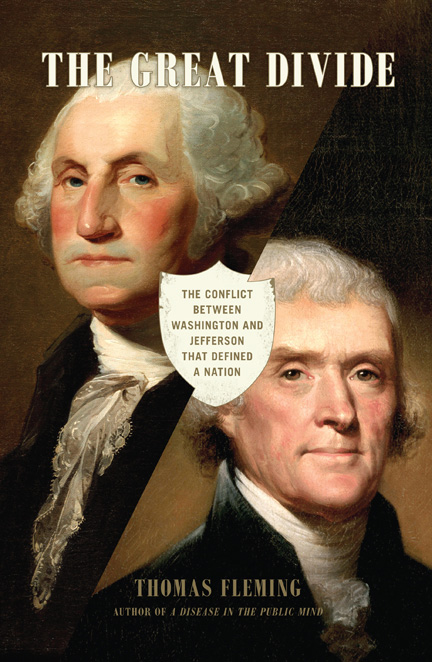
The Great Divide
The Conflict between Washington and Jefferson that Defined a Nation
کتاب های مرتبط
- اطلاعات
- نقد و بررسی
- دیدگاه کاربران
نقد و بررسی

March 16, 2015
At the dawn of the American republic, the Founding Fathers, once united in their common pursuit of freedom, split ideologically. Thomas Jefferson's distrust of monarchical tendencies led him to oppose the more pragmatic and Federalist George Washington. Caught between these two men was James Madison, a confidant of Washington who co-wrote The Federalist with Alexander Hamilton before becoming Jefferson's most brilliant allyâthough Madison returned to his Federalist convictions at the end of his life. Fleming (A Disease in the Public Mind) finds this divide at the heart of every subsequent American political battle, but his book about this era is more polemic than analysis. Fleming has nothing but praise for Washington, whom he sees as a flexible, shrewd, and selfless chief executive. The same cannot be said for Jefferson; the author misses no opportunity to illustrate Jefferson's hypocrisy, arrogance, paranoia, duplicity, and self-pity. Fleming's blatant bias for the Federalists does a great disservice to the issues at hand, reducing a critical disagreement about American governance to a one-sided rant. Despite its imbalance, Fleming's book remains moderately enlightening in its impassioned defense of Washington's presidency, and more entertaining for its interest in the pettiness and foibles of our oft-lionized founders. B&w images.

The camaraderie among America's Founding Fathers did not survive independence in 1783. Disagreement over the role of government grew into virulent antagonism, and that acrimony persists today. Prolific historian Fleming (A Disease in the Public Mind: A New Understanding of Why We Fought the Civil War, 2013, etc.) delivers a vivid, opinionated history of this conflict. The author clearly favors George Washington's famous practicality over Thomas Jefferson's fiery revolutionary fervor. Fleming begins with the Constitutional Convention, chaired by Washington, whose eight years of failure to persuade the Continental Congress to support his Revolutionary army convinced him that the United States needed a strong central government. In France as America's ambassador, Jefferson took no part in the debates and was lukewarm to the outcome. Described by Fleming as "that most troublesome of politicians-an ideologue," Jefferson believed that humans in their natural state-i.e., virtuous American farmers-did not require government. This utopian faith included passionate support of the French Revolution, during which he defended the Terror and mass executions. Fleming portrays Jefferson as a disloyal secretary of state to President Washington and an equally disloyal vice president to John Adams, working behind the scenes to defeat their policies and lying to their faces. As president, he downsized the government, eliminating all internal taxes and crippling the Army and Navy, which were unable to resist the increasing British depredations that led to the War of 1812. Among historians, Jefferson's star has been falling for 50 years. Fleming's frank hostility puts him at the far end of the scale, but he makes a fascinating case that Jefferson's charisma-which peaked early with the Declaration of Independence-was accompanied by fanciful political beliefs that continue to exert a malign influence on the office of the presidency. COPYRIGHT(1) Kirkus Reviews, ALL RIGHTS RESERVED.

March 1, 2015
Just listing the titles of Fleming's previous books (e.g., A Disease in the Public Mind; The Intimate Lives of the Founding Fathers) would take more words than are accorded this review of his latest one. Much of the author's work--both novels and the nonfiction, including his first history book, published in 1960--has explored the American Revolution. Here he focuses on the contentious relationship between George Washington (1732-99) and Thomas Jefferson (1743-1826). Fleming comes down on the side of Washington, the "master politician of his era," whose realism is contrasted with Jefferson's idealism. In their reactions to events such as the French Revolution (1789-99) and the Whiskey Rebellion (1791-94), the two differed, just as in their perceptions of the office of the presidency. Alexander Hamilton, James Monroe, and especially James Madison also figure prominently, with each described in terms of his relationships with Washington and Jefferson. In Madison's case, he eventually "abandoned the divisive ideology that emanated from Thomas Jefferson's Monticello and returned to that realistic visionary, George Washington." Madison's journey, concludes Fleming, is one "that every man and woman in America can and should take--now and in the future." VERDICT Lightly documented, this work is not a research volume, but its clean and snappy prose make for a readable synthesis.--Mark Spencer, Brock Univ., St. Catharines, Ont.
Copyright 2015 Library Journal, LLC Used with permission.

Starred review from March 15, 2015
Iconic American figures, both revered as Founding Fathers and presidents, Washington and Jefferson developed such an antagonistic relationship that they came to regard each other as enemies. Fleming looks beyond the standard history of the founding and early years of the nation to detail the contrasts in the backgrounds and personalities of these men that led to the conflict. Washington, the war hero with no formal education, was 11 years older than the more privileged and educated Jefferson. Washington's pragmatism often clashed with Jefferson's idealism. Their conflicts began with sharply divergent views on the French Revolution, Washington viewing it negatively and Jefferson applauding the struggle for independence. But their greatest disagreements centered on the powerful position of the presidency. Between the two battling politicos stood James Madison, Washington's advisor, then critic, and later supporter again as the three men jousted over political positions that have resounded through generations. A fascinating look at American history from the perspective of personal relationships and political ideals.(Reprinted with permission of Booklist, copyright 2015, American Library Association.)

























دیدگاه کاربران